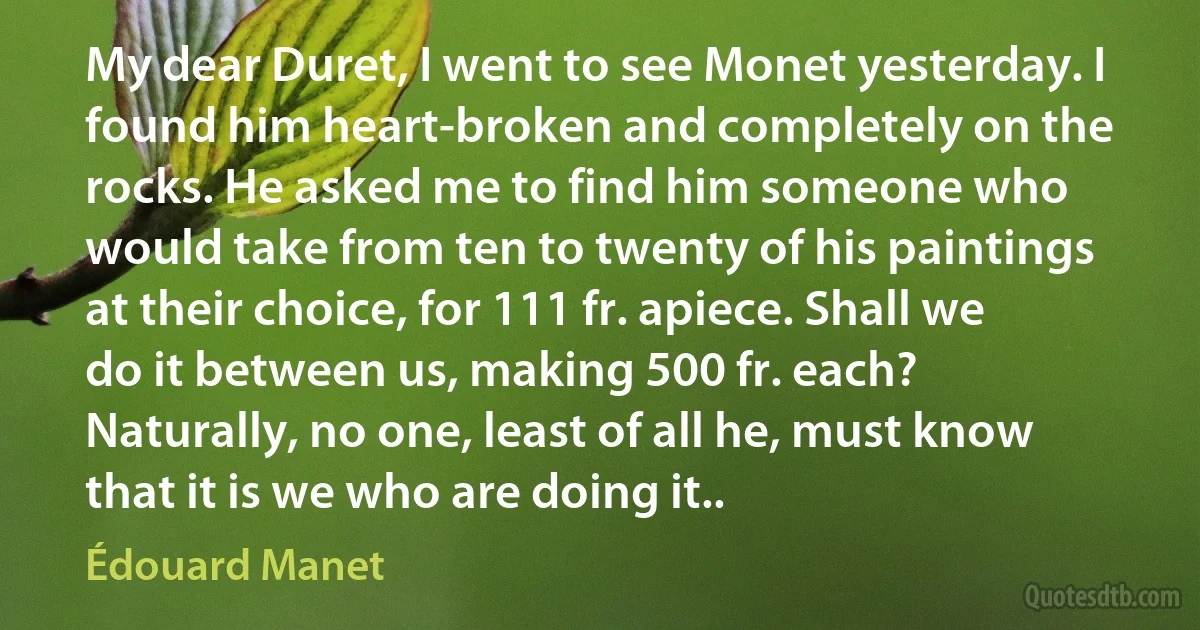Rocks Quotes - page 7
Everything is flowing - going somewhere, animals and so-called lifeless rocks as well as water. Thus the snow flows fast or slow in grand beauty-making glaciers and avalanches; the air in majestic floods carrying minerals, plant leaves, seeds, spores, with streams of music and fragrance; water streams carrying rocks .... While the stars go streaming through space pulsed on and on forever like blood globules in Nature's warm heart.

John Muir
When I first enjoyed this superb view, one glowing April day, from the summit of the Pacheco Pass, the Central Valley, but little trampled or ploughed as yet, was one furred, rich sheet of golden compositae, and the luminous wall of the mountains shone in all its glory. Then it seemed to me the Sierra should be called not the Nevada, or Snowy Range, but the Range of Light. And after ten years spent in the heart of it, rejoicing and wondering, bathing in its glorious floods of light, seeing the sunbursts of morning among the icy peaks, the noonday radiance on the trees and rocks and snow, the flush of alpenglow, and a thousand dashing waterfalls with their marvelous abundance of irised spray, it still seems to be above all others the Range of Light.

John Muir
Rocks and waters, etc., are words of God and so are men. We all flow from one fountain Soul. All are expressions of one Love. God does not appear, and flow out, only from narrow chinks and round bored wells here and there in favored races and places, but He flows in grand undivided currents, shoreless and boundless over creeds and forms and all kinds of civilizations and peoples and beasts, saturating all and fountainizing all.

John Muir
Never have I met another man of such singleness of mind in his devotion to nature as Muir. He lived and moved and had his being as a devotee. ... Of himself he took little heed, but no zealous missionary ever went abroad to spread the gospel with his fervor in communicating a love of nature. And with him a love of nature meant an understanding of her laws. He sauntered over the mountains, claiming kinship with the rocks and growing things and gathering them all to his heart. He has told me that he found it necessary, in getting people to listen, to tell them stories such as his immortal tale of Stickeen, but the real hope in his heart was to awaken their interest so they would want to go to nature themselves and to delve into the mysteries of her ways. ... Every tree and flower, every bird and stone was to him the outward token of an invisible world in process of making.

John Muir
More towers must yet be built-more towers destroyed-
Great rocks hoisted in air;
And he must seek his bread in high pale sunlight
With gulls about him, and clouds just over his eyes...
And so he did not mention his dream of falling
But drank his coffee in silence, and heard in his ears
That horrible whistle of wind, and felt his breath
Sucked out of him, and saw the tower flash by
And the small tree swell beneath him...
He patted his boy on the head, and kissed his wife,
Looked quickly around the room, to remember it,-
And so went out... For once, he forgot his pail.

Conrad Aiken
. Here [ Guernsey ] people bath among the rocks which serve as cabins, since there's nothing else; nothing is more attractive than this mixture of women and men crowded on these rocks. One would belief oneself in a landscape by Watteau rather than in the real world. So I'll have a source of real and graceful motives which I will be able to make use of. Some enchanting bathing-costumes... Nothing is more amusing when one is strolling through these rocks, than to surprise young girls getting ready to bathe... Despite the small number of things that I'll be able to bring back [to Paris], I hope to be able to give you an idea of these charming things.

Pierre-Auguste Renoir
On my seventieth birthday, when I reflected that so many of my friends were dead or dying, it hit me that it was high time I got more work done. Ever since that time, I have done the active, smart thing by increasing my productivity. I'm not on the rocks or shoals yet, but the last few years have been a devastation of illnesses and deaths of many good friends. [Star Trek creator] Gene Roddenberry was a loss that deeply grieved me.

Ray Bradbury
Part of how we come to take command of our world, to take command of our environment, to make these tools by which we're able to do this, is we ask ourselves questions about it the whole time. So this man starts to ask himself questions. "This world," he says, "so who made it?" Now, of course he thinks that, because he makes things himself. So he's looking for someone who would have made this world. He says, "Well, so who would have made this world? Well, it must be something a little like me. Obviously much much bigger. And necessarily invisible. But he would have made it. Now why did he make it?" Now we always ask ourselves "why?" because we look for intention around us; because we always intend– we do something with intention. We boil an egg in order to eat it. So we look at the rocks, and we look at the trees, and we wonder what intention is here even though it doesn't have intention.

Douglas Adams
The holy man, persuaded that they belonged to some idolatrous people and that in their own language they gave adherence to the Christian faith, invited them to receive baptism.
"I think," said he to them, "that you bathe often, for all the hollows of the rocks are full of pure water, and as I came to your assembly I saw several of you plunging into these natural baths. Now purity of body is the image of spiritual purity."
And he taught them the origin, the nature, and the effects of baptism.
"Baptism," said he to them, "is Adoption, New Birth, Regeneration, Illumination."
And he explained each of these points to them in succession.
Then, having previously blessed the water that fell from the cascades and recited the exorcisms, he baptized those whom he had just taught, pouring on each of their heads a drop of pure water and pronouncing the sacred words.
And thus for three days and three nights he baptized the birds.

Anatole France
I believe nothing. I have shut myself away from the rocks and wisdoms of ages, and from the so-called great teachers of all time, and perhaps because of that isolation I am given to bizarre hospitalities. I shut the front door upon Christ and Einstein, and at the back door hold out a welcoming hand to little frogs and periwinkles. I believe nothing of my own that I have ever written. I cannot accept that the products of minds are subject-matter for beliefs. But I accept, with reservations that give me freedom to ridicule the statement at any other time, that showers of an edible substance that has not been traced to an origin upon this earth, have fallen from the sky, in Asia Minor.

Charles Fort
Ikenobo Sen'o, a master of flower arranging, once said (the remark is to be found in his Sayings): "With a spray of flowers, a bit of water, one evokes the vastness of rivers and mountains." The Japanese garden too, of course symbolizes the vastness of nature. The Western garden tends to be symmetrical, the Japanese garden asymmetrical, and this is because the asymmetrical has the greater power to symbolize multiplicity and vastness. The asymmetry, of course, rests upon a balance imposed by delicate sensibilities. Nothing is more complicated, varied, attentive to detail, than the Japanese art of landscape gardening. Thus there is the form called the dry landscape, composed entirely of rocks, in which the arrangement of stones gives expression to mountains and rivers that are not present, and even suggests the waves of the great ocean breaking in upon cliffs.

Yasunari Kawabata
The love of awakened motherhood is a love and compassion felt not only towards one's own children, but towards all people, animals and plants, rocks and rivers-a love extended to all of nature, to all beings. Indeed, to a woman in whom the state of true motherhood has awakened, all creatures are her children. This love, this motherhood, is Divine Love-and that is God.

Mata Amritanandamayi
The historical Jesus will be to our time a stranger and an enigma. The study of the Life of Jesus has had a curious history. It set out in quest of the historical Jesus, believing that when it had found Him it could bring Him straight into our time as a Teacher and Savior. It loosed the bands by which He had been riveted for centuries to the stony rocks of ecclesiastical doctrine, and rejoiced to see life and movement coming into the figure once more, and the historical Jesus advancing, as it seemed, to meet it. But He does not stay; He passes by our time and returns to His own. What surprised and dismayed the theology of the last forty years was that, despite all forced and arbitrary interpretations, it could not keep Him in our time, but had to let Him go. He returned to his own time, not owing to the application of any historical ingenuity, but by the same inevitable necessity by which the liberated pendulum returns to its original position.

Albert Schweitzer
![When I reached the [Yosemite] valley, all the rocks seemed talkative, and more lovable than ever. They are dear friends, and have warm blood gushing through their granite flesh; and I love them with a love intensified by long and close companionship. ... I ... bathed in the bright river, sauntered over the meadows, conversed with the domes, and played with the pines. (John Muir)](https://cdn.quotesdtb.com/img/quotes_images_webp/56/john-muir-blood-bright-303656.webp)


